Indian Women’s and Maharashtra state cricket team’s all-rounder, Anuja Patil is today a household name owing to her on-field heroics and grit, but very few people know about her story of becoming who she is today. A small-town superstar as they would say, coming from a small Maharashtrian city-district of Kolhapur to sporting the blues for the nation, she has come a long way.
Anuja narrates this story in an exclusive chat with Female Cricket as we talk cricket, life, struggles, movies, and all-in-all, her journey.
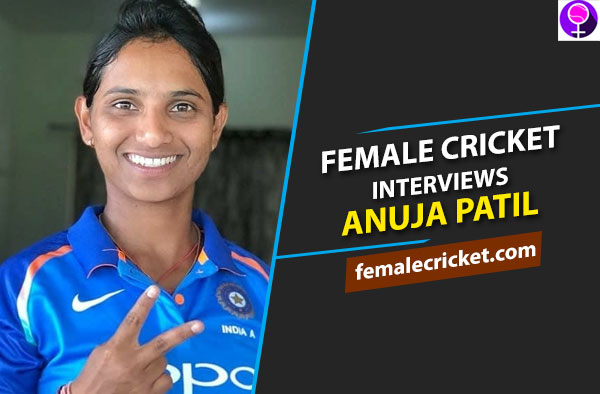
Tell us something about your early life and how it all began?
I started playing in 2004 – I played U15 for Maharashtra state for 2 years, then U19 for 4 years out of which I led the team for 2 years and finally debuted in the women’s senior team at 17 and lead the team for 5 years. My father was a cricketer himself so that’s what drew me towards the game. I used to play tennis ball cricket with my father and uncle and they have always been very supportive of me and my career. They never stopped me saying “It’s a boy’s game”. They rather encouraged me to chase my dreams.
Hailing from a small city lacking facilities, how did you know how to go about your cricketing journey?
I trained under a former Ranji player, he had a lot of experience and knowledge about the game, he helped me a lot, under him I used to go for selection trials so that’s how I knew how to go about it. I trained at Anil Sangaonkar academy and Sahara academy. Societal pressure always existed but with the constant support of my parents, who were very sure that I will play for India, made it all easier.
What do you enjoy more – batting or bowling? Do you like any other sport?
Both equally I would say. It depends on the situation honestly – whatever the team needs works for me.
I’ve grown up watching cricket so I was always directed towards it more than anything else, but apart from it, I like football. I play football with my brother whenever I am home. Kolhapur is famous for football and wrestling.
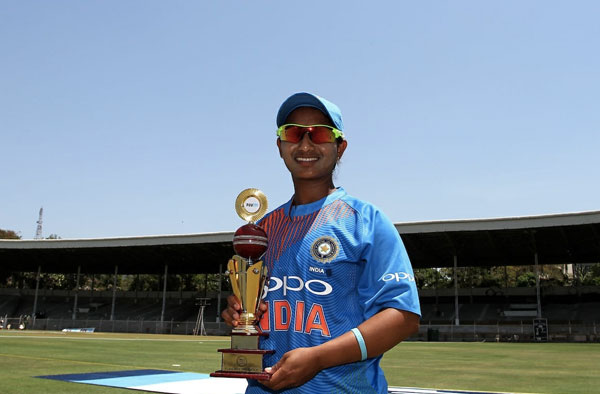
How advantageous do you think being from a big city is in the cricketing field?
It is definitely advantageous. Take Mumbai, Delhi or Bangalore, they have so many better facilities compared to the small cities, because of this their players never feel like they are under-prepared. Even before they reach a good level, they have already experienced playing on good grounds and wickets so they don’t face problems going ahead.
But I always told myself in spite of not getting good facilities, I can go ahead on the basis of my talent and that motivated me.
What was your reaction when you got a call-up to represent India?
I was determined to play for India and always saw it coming. I debuted in 2012 World T20 in Sri Lanka. I was a little nervous because I had to directly play the world cup but I told myself to enjoy my game and not succumb to pressure and that’s what I did.
Was it daunting initially to face the seniors? How did they treat you?
I was a little scared to face them but they were all very supportive and helpful. We worked together as a team since the beginning.
What are some games you will always remember?
India playing against Australia recently in the world cup and India’s tour of Australia in 2016. These are the most memorable ones for me.
And a match you lost but is a memorable one? How important is losing games?
India v West Indies in the world cup is one. Losses certainly help you. Wins and losses are equally important – the losses help you focus on the little mistakes you made as a team that you would have ignored if you won that game.
How do you deal with pressure?
I just enjoy my game and focus on my strengths. On my bad days, my family is supportive. From the team, as a captain, Harmanpreet has a chat with me and Poonam Yadav, Veda Krishnamurthy, and Punam Raut are very supportive towards me.
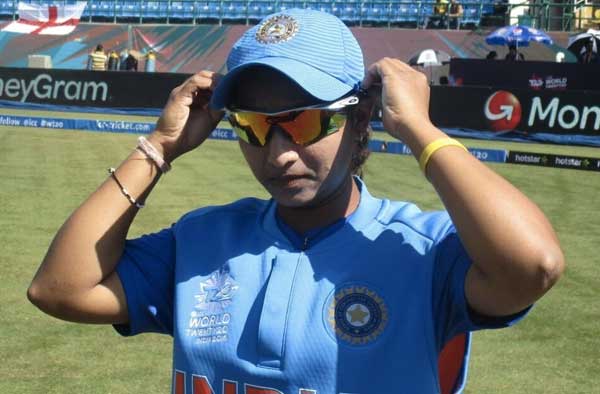
You’re experienced as to where leading the team is concerned, how do you think that experience helped in molding you as a player?
Captaincy helped reduce my short temper and made me empathize with my teammates – which matters a lot in a team game. It tremendously improved my leadership skills and my game too.
“Captaincy teaches you to think about the team before yourself”
Who are your idols and what are some of their qualities you try to inculcate in your game?
I am very fond of Yuvraj Singh, he’s a total match-winner and handles pressure situations well – even MS Dhoni in this aspect. He knows his player’s strengths and uses them in accordance with the situation and this is something I try to apply while leading the team.
How do you adapt yourself to the T20 format and what role does fielding play in a game?
T20, personally, is my favorite form of the game because it is short and entertaining. Being aware of one’s strengths and the team’s needs helps in this format and that’s what I try to do. Fielding is extremely important for it saves the team those extra runs that go a long way and help the bowlers too.
What is the role of a coach in a player’s life?
The coach is very important and personally, has helped me a lot in shaping my career the way it has. They help with match preparations, technique improvements and help in shaping a player’s mindset before a game. The talent is within oneself but a coach helps in sharpening those skills.
How have things changed post World Cup 2017 and how is BCCI with the support and facilities?
Post the world cup things have tremendously improved. Players are now getting the deserved recognition, endorsements and contracts unlike before. Women’s cricket is changing in India. People are taking more interest in our game – even young girls from small cities have started playing and parents are becoming more supportive with their daughters looking at cricket as a career option.
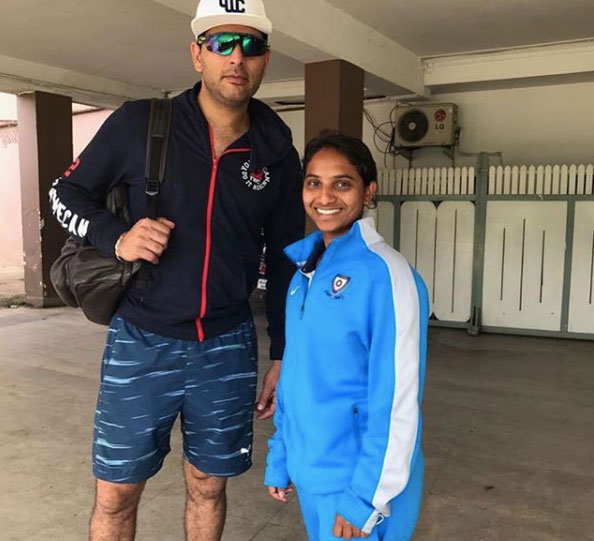
In what aspects can BCCI improve to promote women’s cricket even more?
Women’s cricket in India needs a league like the Australian Women’s Big Bash League, this will help bridge the gap between domestic and international players and help improve their game. They will get a lot of exposure and sharing the dressing room with the best international players in itself is huge.
What is your opinion on the on-going talks on the mixed-gender games? How do you think the gap between the genders can be bridged?
The game men and women play are very different but something like this would be motivating and even a learning lesson for the female cricketers in aspects like fitness. It would further help in bridging the gap between the male and female teams. Again, playing leagues and the women’s matches need to be televised more so that it gets more attention and the players get more recognition.
You had one gap year – what was your focus then? And what is your ultimate dream as a cricketer?
I focused on improving my speed as a bowler, improving my fitness and better shot selection. The ultimate dream, like any other cricketer, is to help my team lift the world cup.
Do you like watching movies? If a biopic were to be ever made on you, which actress would you like to play your role?
I love watching movies especially the inspirational ones or love stories. Biopic is something I have never even thought of (laughs), but if I had to take a name it would be Parineeti Chopra.
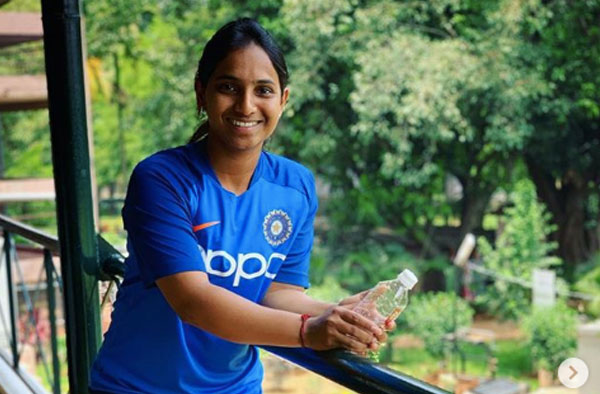
What is your message for young girls taking up cricket?
I would just like to say that the facilities are better now so all you need to do is work hard, remain focused, use the facilities wisely and work on your fitness, especially strength and conditioning.
Have you read about Female Cricket and would you like to give any suggestions?
I follow your page on social media! You guys are doing very well. What I like about your page is you all cover it all – from the domestic players to the international ones, the focus is on everyone equally. That is something great.

Female Cricket is a digital news portal that aims to spread, share and celebrate the journey of our female cricketers around the world.